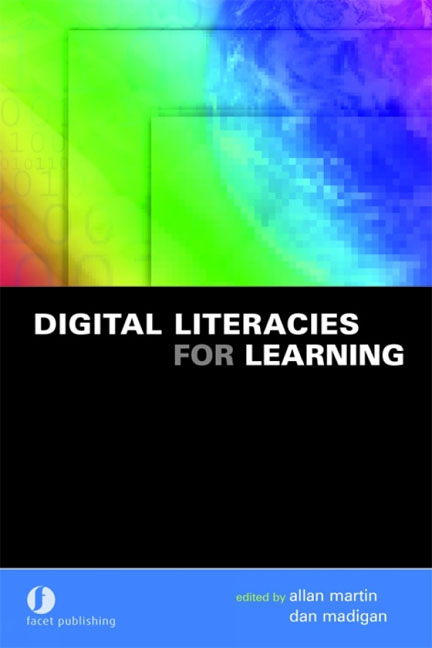Book contents
- Frontmatter
- Contents
- Dedication
- The contributors
- Foreword
- Preface
- Part I Literacies in the digital age
- Part II Enabling and supporting digital literacies
- 12 Supporting and enabling digital literacy in a global environment: preview of Part 2
- 13 A ‘dense symphony of the nation’: Cymru Ar-Lein and e-citizens and e-communities in Wales
- 14 The impact of information competencies on socio-economic development in Southern Hemisphere economies
- 15 Supporting students in e-learning
- 16 The information commons: a student-centred environment for IT and information literacy development
- 17 Socio-cultural approaches to literacy and subject knowledge development in learning management systems
- 18 Approaches to enabling digital literacies: successes and failures
- 19 Professional development and graduate students: approaches to technical and information competence
- 20 Windward in an asynchronous world: the Antiguan initiative, unanticipated pleasure of the distance learning revolution
- 21 A tale of two courses
- Index
20 - Windward in an asynchronous world: the Antiguan initiative, unanticipated pleasure of the distance learning revolution
from Part II - Enabling and supporting digital literacies
Published online by Cambridge University Press: 08 June 2018
- Frontmatter
- Contents
- Dedication
- The contributors
- Foreword
- Preface
- Part I Literacies in the digital age
- Part II Enabling and supporting digital literacies
- 12 Supporting and enabling digital literacy in a global environment: preview of Part 2
- 13 A ‘dense symphony of the nation’: Cymru Ar-Lein and e-citizens and e-communities in Wales
- 14 The impact of information competencies on socio-economic development in Southern Hemisphere economies
- 15 Supporting students in e-learning
- 16 The information commons: a student-centred environment for IT and information literacy development
- 17 Socio-cultural approaches to literacy and subject knowledge development in learning management systems
- 18 Approaches to enabling digital literacies: successes and failures
- 19 Professional development and graduate students: approaches to technical and information competence
- 20 Windward in an asynchronous world: the Antiguan initiative, unanticipated pleasure of the distance learning revolution
- 21 A tale of two courses
- Index
Summary
Abstract
This chapter explores the e-literacy impact of Skidmore College's University Without Walls (UWW) online asynchronous bachelor degree programme on the Caribbean island of Antigua. Primarily enrolling the island's teachers, mostly women, UWW's online courses, the author argues, have played a fundamental role in bringing a new pedagogical philosophy and digital literacy to this small and somewhat isolated island nation. For island teachers, participation in asynchronous courses offered wonderfully exciting opportunities to share ideas, teaching experiences, and community histories with other students located around the world. Rum, Slaves and Molasses, an online history course concerning the African slave trade, brought these teacher-students, via the power of the internet, new insights into their own Afro-Caribbean history. These valuable perspectives were quickly introduced into the teacher-students’ own classrooms, offering new generations of Antiguan young people a more positive interpretation of their own African past and the important nation-building role played by their enslaved ancestors. In this learning process, these students were also taught how to create their own websites, to research archives around the world, and to access secondary sources totally unavailable on an island with almost no library facilities. The introduction of these web design skills and related valuable e-literacy tools to these teachers, and then to their students, ultimately brought their unique Antiguan story alive. The internet, coupled with constructivist e-learning strategies, allowed these island educators, previously isolated, to share their distinctive history with people around the globe.
In UWW's Antiguan initiative we see not only the power of e-literacy to transform learning architecture, but also a glimpse of the pedagogical future: the revolutionary impact of ICT and e-literacy on human societies. As educators, this experience allows us to marvel again at the enormous learning capacity inherent in allowing students to speak directly to each other across the world's vast distances; to share diverse cultural experiences and confront deep historical divides; to explore new ideas and information; and to ‘construct knowledge’ from common collective information. In that process, we also see in Antigua the earliest transformation of an entire culture's educational pedagogical foundation (albeit that of a small island nation).
Introduction
In the age of sail, windward and leeward described crucial attributes for ships, often slavers, bound for Caribbean sugar islands.
- Type
- Chapter
- Information
- Digital Literacies for Learning , pp. 215 - 225Publisher: FacetPrint publication year: 2006

